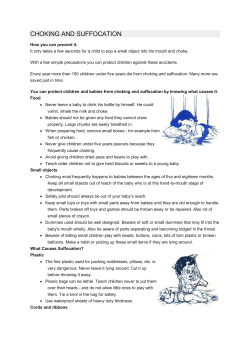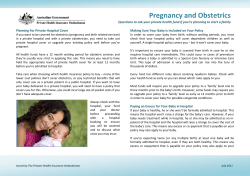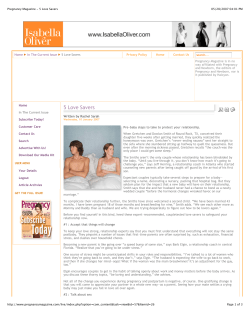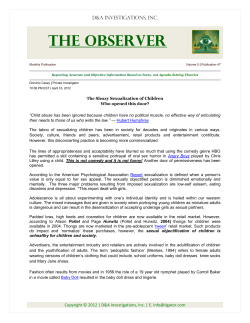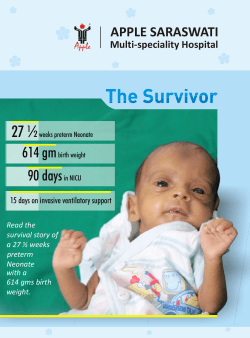
Take Good Care of Your Baby: Everyone Can Help Protect Children
Everyone Can Help Protect Children If you believe a child is being abused or neglected, call the New York State Central Register of Child Abuse and Maltreatment Hotline at Take Good Care of Your Baby: 1-800-342-3720 (24 hours a day, 7 days a week). All calls are confidential.* What Everyone Can Do IF YOU THINK A CHILD IS IN IMMEDIATE DANGER, CALL 911. *Malicious and false reporting to the State Central Registry is against the Law. Michael R. Bloomberg, Mayor John B. Mattingly, Commissioner, ACS Thomas R. Frieden, M.D., M.P.H., Commissioner, DOHMH ACS196005E - 05.06 For more information about how Children’s Services can help you be the best parent you can be, go to www.nyc.gov/acs or call 311 and ask for the PARENT HELPLINE. You are the most important person in your baby’s life. That’s wonderful. It is also a huge responsibility: Besides loving your child, your job is to keep him or her healthy and safe. Don’t be afraid to ask for help from people you trust. At the Administration for Children’s Services and the Department of Health and Mental Hygiene, we want to help you to be the best parent you can be. This booklet gives you ways to prevent accidents and protect your baby from harm. Nothing in it is complicated or costly. If you have any questions or concerns about parenting, visit www.nyc.gov/acs or call 311 and ask for the Parent Helpline. Contents Contents 1. Never shake your baby pg 2 It is a crime to shake a baby When your baby cries 2. Never leave your baby alone pg 4 At home Outside the house In case of an emergency 3. It’s safest for baby to sleep alone pg 6 Put your baby ‘back to sleep’ To protect against SIDS 4. Childproof your home pg 8 A Message to Immigrant Families All of the services offered in this booklet are available to children and families regardless of immigration status, even if you are undocumented. We do not ask about immigration status or share what you tell us with immigration authorities. Information about your status can be released only rarely, such as in a criminal or terrorist investigation. For non-emergency New York City information, including copies of this booklet and other helpful publications in English, Spanish, and other languages, CALL 311 – Telephone interpretation is available in more than 170 languages. Administration for Children’s Services also has interpreters to help you communicate with us. Window guards prevent falls Other ways to make your home safe Prevent burns and falls If there’s a weapon in your home 5. Protect against lead poisoning pg 12 6. Be the best parent you can be pg 14 Get help for alcohol and drug abuse Quit smoking Get help for depression A home without violence 7. Choose your caregiver carefully: pg 16 Think twice, then think again A good babysitter Safe and nurturing childcare Before enrolling your child 1 Never Shake Your Baby No matter how angry or frustrated you feel when your baby or toddler cries – and no matter how much he or she cries – never shake your baby or toddler. Shaking can cause bleeding in the brain that can injure or even kill a child. It takes only a few seconds of shaking to seriously hurt a baby’s developing brain. It is a crime to shake a baby. Babies cry. Crying is their way of telling us they are uncomfortable or unhappy. A crying baby is not “bad” or “spoiled.” 2 It’s normal for babies to cry on and off during the day, especially during the evening. It’s normal for them to keep crying, sometimes for a long time, even while you are trying to comfort them. Sometimes even healthy, well-fed babies get colic, at about 2 to 6 weeks. Colicky babies may cry for hours, arch their backs, and be unable to fall asleep. That’s hard to take. Still, crying always stops. But the damage from shaking a baby can last a lifetime. When your baby cries... • Make sure he or she isn’t hungry, wet, cold, or hot. • Offer a pacifier. • Walk around holding the baby close to you, in your arms or in a carrier. Talk or sing to him. • Call a trusted friend, relative, or neighbor to talk to, or ask someone to come over and keep you company. • Exercise or listen to some music. • When all else fails, put your baby in the crib. Make sure she’s safe. Check in every 5 minutes or so. It is much better to let the baby cry than to do something to stop the crying that may be harmful. If you feel you can’t cope or need help, call 311 and ask for the Parent Helpline any time, day or night, or visit www.preventchildabuseny.org You can also call the Council of Family and Child Caring Agencies at 1-888-763-KIDS. 3 2 Never Leave Your Baby Alone Even for a Few Minutes Young children, especially toddlers, love getting into things. Their curiosity is natural and good – it’s the way they learn. But you have to make sure that your child doesn’t accidentally hurt himself. To be sure your child is safe at home: • Never leave a child alone in the house, even if you’re just going to pick up the laundry or talk to a neighbor on your floor. 4 • Never leave a child alone in a car, even to run into a store for a few minutes. Children have died when left alone in cars. • Never leave a child alone in the bathtub or near water. Babies and young children can easily drown in tubs, buckets, or toilets. It can happen in as little as an inch of water, and it can happen fast. • Always keep an eye on your child, even if she is close by. When accidents happen, parents often report that they had turned their backs “just for a second.” • Keep one hand on the baby while changing diapers. Don't leave a baby alone on a changing table. • If you are cooking or working and cannot be watching, put the baby in a crib or playpen. Outside the house: • Always go with your child, or make sure he or she is with an adult you trust, to places outside your home – including those nearby, such as a playground or store. • When you’re outside, watch your child closely. While you’re looking away, she could walk in front of a car, pick up broken glass, eat something from the sidewalk, or wander off. • Never ask a stranger to watch your child, not even for a minute. In case of an emergency: • If you are called away quickly in an emergency, don’t leave your child alone: Ask a trusted and responsible relative, neighbor, or friend to babysit. • Provide contact information so you can be easily reached – your phone number or that of someone who can find you quickly. Be sure you have the caregiver’s information as well. • Make sure your home has a working phone or the caregiver has a working cell phone. 5 3 It’s Safest for Baby To Sleep Alone Sleeping with your baby (“co-sleeping”) can be dangerous. If an adult or child rolls over on a baby, the baby can be hurt or even suffocated. It’s particularly dangerous to sleep with a baby on a couch, with other children sharing the bed, or if you or anyone in the bed. . . • Is very overweight. • Has been drinking, using marijuana or other drugs, or is taking medicine that causes sleepiness. SIDS is also called “crib death.” But cribs don’t cause “crib death.” SIDS can happen anywhere a baby is sleeping. • Is very tired or ill. 6 • Is a smoker. Babies exposed to second-hand smoke are at higher risk for Sudden Infant Death Syndrome (SIDS). You can safely keep your baby close during the night, in your room, by placing him or her in a crib or bassinet near your bed. When the baby wakes, you can easily breastfeed, give a bottle, or comfort her or him. When you are finished, lay the baby on his back, in his own bed. Put your baby ‘back to sleep’ SIDS (also known as Sudden Infant Death Syndrome) is a major cause of infant death. Most SIDS deaths happen between 4 and 6 months of age. Although SIDS is rare, African-American babies are twice as likely to die of SIDS as other babies. To protect against SIDS: • Always put your baby to sleep on his or her back. • Use a firm mattress, without pillows, stuffed toys, or blankets near the baby’s face. • Never put the baby to sleep on an adult bed, sofa, waterbed, sheepskin, or other soft mattress—even for a nap. • Don’t let your baby get too warm. Keep the room temperature between 65 and 70 degrees Fahrenheit. • Use a separate crib for each baby. • Do not permit the family pet to sleep in the crib. For more information about SIDS, call the New York City SIDS Center at (212)686-8854. 7 4 Childproof Your Home Millions of children are injured in and around their homes each year. But a few easy, inexpensive measures will help prevent accidents that could hurt or even kill your baby. Window guards prevent falls Every year, children are badly hurt – or killed – falling from windows. Even a fall from a first-floor window can kill a child. 8 By law, owners of buildings with 3 or more apartments must supply, install, and maintain window guards in any apartment where children 10 years of age or younger live. • Ask your landlord to install window guards if you don’t have them. Even if you don’t have a young child, if you ask for guards, the landlord must install them. It’s a good idea to have them if children often visit your home. Landlords may not charge for window guards, so it’s a free and easy way to ensure safety. • It’s against the law to get in the way of the installation or take required guards from the windows. Other ways to make your home safe: • Make sure TV sets are stable and tape wires out of the way. Don't leave children alone in a room with a TV or any electronic equipment that could fall or tip over. • Put covers on electrical outlets, to keep small fingers from poking into them. • Use safety latches on low cabinets and drawers, especially in the kitchen and bathroom. • Store all medicines and hazardous products (cleaning products, pesticides, or other chemicals) where children can’t get to them. • Buy medicines with childproof caps and always keep them closed. • Keep plastic bags out of reach of children. • Check toys for small parts that can be swallowed or inserted into ears or noses. • Install safety gates at the top and bottom of stairs to keep children from falling. Gates that screw to the wall are more secure than "pressure gates." • Tie window-blind cords up high. A child can choke playing with a cord. • Use bumpers to cushion corners of coffee tables or other sharp-edged or low furniture. Prevent burns and falls In the kitchen: • When you’re cooking, use the back burners when you can. • Be careful to keep hot coffee, tea, milk, or water away from the baby. 9 • In the bath, test the water on your wrist before putting the baby in the tub or sink. Around the house: • Keep matches out of reach of children. • Never leave a candle burning unattended or where a child can touch it. Outside your home: • Don’t let babies or children play in the halls, stairwell, or elevator. • Keep your baby strapped securely in the stroller. • Use playgrounds with rubber or sand on the ground, not concrete. Make sure your child plays on age-appropriate equipment, such as the baby swing. Stay close while the baby plays. 10 • When traveling in a car, keep your baby safe with a federally approved car seat. • Get the right-sized car seat (infant, toddler, small child). • When you put in the car seat, follow instructions carefully. The best place is in the center of the back seat. • An infant car seat should face backward until the baby is at least 20 pounds and 12 months old. IF THERE’S ANY KIND OF WEAPON IN YOUR HOME, put it where children cannot touch it. Keep guns unloaded with the trigger locked, inside a lockbox. 11 5 Protect Against Lead Poisoning Lead can harm children’s health, learning, and behavior – and young children are at the highest risk. 12 • Lead paint is the most common cause of childhood lead poisoning. New York City banned lead paint in 1960, but older buildings may still have it on walls, windows, doors, and other surfaces. If paint is peeling or damaged, chips and dust can spread. Children can swallow lead dust when they put their hands and toys in their mouths. Remind your doctor to test your child for lead poisoning at ages 1 and 2 (as required by law). Ask the doctor about testing older children. • Tell your landlord you have a small child in your home. The law requires landlords to inspect and repair lead-based paint hazards in most older buildings or where a child under 7 lives. Call 311 if your landlord fails to fix peeling paint. • Keep children away from peeling paint and renovations. • Wash children’s hands, pacifiers, and toys often. • Clean floors, windowsills and dusty places often with a wet mop or cloth. • Don’t use items that may contain lead, such as imported pottery, cosmetics, or traditional medicines. • Use cold (not hot) tap water for baby formula, drinking, and cooking. Run the water for a couple of minutes before using it. 13 6 Be the Best Parent You Can Be Get help for alcohol and drug abuse Alcohol and drug abuse are illnesses that can be treated. To be the best and healthiest parent you can be, get help for alcohol and drug problems. Talk to your doctor or call 1-800-LifeNet (1-800-543-3638), or call 311 and ask for LifeNet. Quit smoking - for your own and your baby’s sake 14 Exposing your baby to second-hand smoke is like making your baby a smoker. Second-hand smoke can: • Raise the baby’s risk of SIDS. • Keep your baby’s lungs from growing right. • Cause asthma, bronchitis, pneumonia, eye and ear problems, and heart conditions. Fires caused by cigarettes can injure or kill your baby! Getting help greatly improves your chances of quitting. The Health and Hospitals Corporation’s quit-smoking clinics offer free or low-cost counseling and other services at locations throughout New York City. Call 311. Get help for depression It is normal to feel tired, frustrated, anxious, or lonely at times when you have a young child. But if you are feeling guilty, hopeless, or overwhelmed much of the time, you may be experiencing depression. Depression can be treated with medication and/or therapy. Talk to your health care provider or a mental health professional or call 1-800-LifeNet (1-800-543-3638), or call 311 and ask for LifeNet. A home without violence A home that is free of drugs and violence provides a foundation for children to flourish and become strong, healthy adults. No one should have to live with violence or abuse. Whether you and your partner are straight or gay, married, living together, dating, or separated, domestic violence is a crime. For information and help, call the city’s confidential Domestic Violence Hotline at 1-800-621-HOPE (1-800-621-4673), or call 311 and ask for the Hotline (TDD: 1-800-810-7444). You can get help even if you are poor or undocumented. IN EMERGENCIES CALL 911. 15 7 Choose Your Caregiver Carefully Think Twice, Then Think Again A good babysitter Sometimes you need a sitter, whether for an hour or a day. But not everyone is good at taking care of young children, especially infants. Before leaving your child with someone else – even for a few minutes – think hard. Ask around. Be sure the babysitter: • Is an adult, not another child. • Is well known to you. 16 • Has experience taking care of babies and young children (she may have children or grandchildren of her own). Safe and nurturing childcare Good child care is more than babysitting. It encourages children to play and learn in a warm, exciting environment. To keep children safe and healthy while they are in a provider’s care, the government licenses and regulates child-care facilities and inspects them regularly. • Is patient and mature enough to deal with a fussy, overexcited, or crying baby. Before enrolling your child, make sure: • Understands that young children must always be watched. • The provider has a current New York City license. It must be posted on a wall where you can see it. • Will never shake, hit, yell at, make fun of, or withhold food from your child as punishment. • Does not smoke, abuse alcohol or drugs, or carry a weapon and will not take your child to be with people who are drinking, using or selling drugs, or carrying weapons. • The site has passed its last inspection. Reports are available at www.nyc.gov/health or by calling 311. • The site has window guards, soap and paper towels for washing, and refrigeration for foods. • Is not using a prescription medication that has bad side effects or makes her drowsy. • There is enough space and enough staff to give the children the attention they need. If you have the slightest feeling that this person will not be a good caregiver, DON’T leave your child with her or him. • You feel comfortable leaving your child at the site. For more information about child care, call 311 and ask for the Child Care brochure. 17
© Copyright 2025

